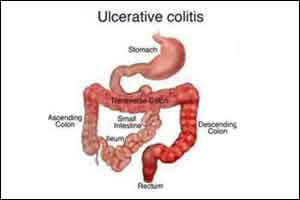- Home
- Editorial
- News
- Practice Guidelines
- Anesthesiology Guidelines
- Cancer Guidelines
- Cardiac Sciences Guidelines
- Critical Care Guidelines
- Dentistry Guidelines
- Dermatology Guidelines
- Diabetes and Endo Guidelines
- Diagnostics Guidelines
- ENT Guidelines
- Featured Practice Guidelines
- Gastroenterology Guidelines
- Geriatrics Guidelines
- Medicine Guidelines
- Nephrology Guidelines
- Neurosciences Guidelines
- Obs and Gynae Guidelines
- Ophthalmology Guidelines
- Orthopaedics Guidelines
- Paediatrics Guidelines
- Psychiatry Guidelines
- Pulmonology Guidelines
- Radiology Guidelines
- Surgery Guidelines
- Urology Guidelines
Cobitolimod - a new drug for active ulcerative colitis

New scientific data on the mechanism of action of cobitolimod has been presented by the company InDex Pharmaceuticals Holding AB for its lead drug candidate. The findings show that cobitolimod can modulate the immune system in ulcerative colitis by balancing the mucosal Th17/Treg cell response.
Cobitolimod has demonstrated clinical efficacy and a favourable safety profile in inducing clinical remission in patients with active ulcerative colitis. Ulcerative colitis is a chronic disease caused by inflammation of the large intestine. Accumulating evidence indicates that an imbalance between T helper 17 (Th17) and T regulatory (Treg) cells and their associated cytokines promotes a pro-inflammatory state in ulcerative colitis. To further investigate cobitolimod's mechanism of action, its immunomodulatory effects were analysed in an experimental colitis model and in blood and tissue samples of ulcerative colitis patients.
Treatment with cobitolimod demonstrated therapeutic efficacy in the standard experimental model of colitis. At the same time, Th17 cells and pro-inflammatory IL-17 and IL-6 cytokines were significantly decreased after cobitolimod treatment. In line with these data, cobitolimod significantly decreased IL-17 and significantly increased the anti-inflammatory IL-10 expression in immune cells from ulcerative colitis patients in vitro. Furthermore, analysis of colon biopsies of ulcerative colitis patients taken before and four weeks after administration of cobitolimod showed a significant induction of IL-10 positive and a pronounced reduction of IL-17 positive immune cells after cobitolimod treatment, which was not observed in placebo treated patients. In addition, Treg cells were significantly increased in the colon upon treatment with cobitolimod.
These data were obtained in collaboration with the University of Erlangen-Nürnberg in Germany.
"With these new interesting data we have gained a deeper understanding of how cobitolimod mediates its anti-inflammatory effects," said Professor Raja Atreya of the University of Erlangen-Nürnberg. "By balancing the Th17/Treg cell immune response, cobitolimod addresses new therapeutic targets in the immunopathogenesis of ulcerative colitis."
"This supporting mechanistic data is a valuable complement to the clinical findings with cobitolimod," said Peter Zerhouni, CEO of InDex Pharmaceuticals. "The Th17/Treg pathway is currently attracting a lot of interest from the pharmaceutical industry as a promising avenue for intervening in various autoimmune and inflammatory diseases, including inflammatory bowel disease."
Cobitolimod in brief
Cobitolimod is a new type of drug that can help patients with moderate to severe ulcerative colitis back to a normal life. It is a so-called Toll-like receptor 9 (TLR9) agonist, that can provide an anti-inflammatory effect locally in the large intestine, which may induce mucosal healing and relief of the clinical symptoms in active ulcerative colitis. Cobitolimod has achieved clinical proof-of-concept in moderate to severe active ulcerative colitis, with a very favorable safety profile. Data from four placebo-controlled clinical trials indicate that cobitolimod has statistically significant effects on those endpoints that are most relevant in this disease, both from a regulatory and clinical perspective. These endpoints include the key clinical symptoms such as blood in stool, number of stools, and mucosal healing, respectively. Based on the encouraging results from earlier studies InDex is now performing the phase IIb study CONDUCT to evaluate higher doses and dose frequencies than investigated in previous studies with cobitolimod. The goal of the study is to optimise the treatment and achieve substantially higher efficacy, while maintaining the compound's excellent safety profile. The CONDUCT study will include 215 patients with left-sided moderate to severe active ulcerative colitis at 90 sites in 12 countries. It is a randomised, double-blind, placebo-controlled study for evaluating cobitolimod's efficacy and safety in inducing clinical remission compared to placebo. The dose optimisation study investigates three different dose strengths of cobitolimod and two different dose frequencies. The objective is to have top line results from the study in the fourth quarter of 2018. Cobitolimod is also known as Kappaproct® and DIMS0150.

Disclaimer: This site is primarily intended for healthcare professionals. Any content/information on this website does not replace the advice of medical and/or health professionals and should not be construed as medical/diagnostic advice/endorsement or prescription. Use of this site is subject to our terms of use, privacy policy, advertisement policy. © 2020 Minerva Medical Treatment Pvt Ltd